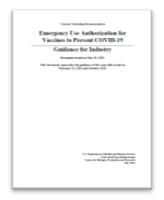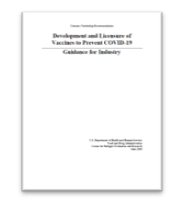Critical reagents are reagents used in the development and testing of FDA-regulated vaccines and therapeutics. The FDA has published guidance documents for the production and use of such critical reagents for COVID-19. These guidances are being regularly updated to reflect the evolving pandemic and increasing number of variants.
Updated guidance documents request drug and vaccine developers to actively monitor SARS-CoV-2 mutations and assess the efficacy of vaccines and therapeutics against emerging variants, during clinical testing and post-approval. Adherence to these FDA recommendations early in development can speed up the progress of your IND, BLA, or EUA application.
Integral Molecular’s technologies were developed using 20+ years of virology experience and our products are manufactured with stringent quality controls. Our scientists are constantly monitoring genomic databases for emerging SARS-CoV-2 variants. As they arise, we alert and make these variants available to our customers. Since the start of the pandemic, we have provided reagents for more than 100 labs working on COVID-19 vaccines and therapeutics in industry and academia. Learn more about how our solutions can accelerate your development while achieving FDA compliance.
We are in this together.
Our technologies can help you meet FDA recommendations for COVID-19 vaccines and therapeutics
Vaccines and Modified Vaccines
Need: The FDA has stated an urgent need to evaluate vaccines against SARS-CoV-2 variants. Vaccines are required to demonstrate the ability to induce a neutralizing antibody response. “Modified vaccines” are made by the same process and manufacturer of an existing vaccine, but are altered to enhance efficacy against SARS-CoV-2 variants, and can obtain an emergency use authorization (EUA) amendment from the FDA.
The ability to induce a neutralizing antibody response is emerging as the correlate of protection for COVID-19 vaccines, and it can be tested in immunogenicity studies using neutralization assays with patient serum samples. Live virus neutralization assays carry significant safety concerns, are time consuming, and are prone to high variability. The FDA has endorsed assays using pseudovirus (e.g. RVP reporter virus) to assess antibody neutralization responses.1
1Emergency Use Authorization for Vaccines to Prevent COVID-19: Guidance for Industry. Page 22, section 4.
| FDA Recommendation | Our Solution |
| Preclinical studies should thoroughly characterize the immune response to the vaccine in animal models, including neutralization assays to evaluate the functional activity of the immune response. | Serum neutralization assays using Integral Molecular’s reporter virus particles (RVPs) are a convenient BSL-2 safe alternative to using live virus, with an excellent correlation (R2 = 0.92) between live-virus and RVP assay results (Xiang et al., Science, 2020). |
| Immunogenicity studies should assess the immune response induced by the modified vaccine against the variant(s) of interest. | Integral Molecular offers the most extensive catalog of SARS-CoV-2 variant RVPs (>65 and growing), including all major variants currently in circulation. |
| Clinical studies of modified vaccines should be sufficiently powered to demonstrate immunogenic noninferiority to the prototype vaccine. | The safe handling and quantitative readouts (luciferase/GFP) of RVPs make them compatible with high-throughput studies required for screening hundreds or thousands of clinical samples. |
FDA guidance documents:
Antibodies
Need: Guidances for therapeutic antibodies targeting SARS-CoV-2 include recommendations regarding in vitro potency assays for lot release, assessment of activity against emerging variants, characterization of the antibody epitope, and assessment of possible antibody cross-reactivity.
Potency assays such as in vitro neutralization are required to support a biologics license application (BLA). Sponsors need convenient tools to perform neutralization assays with the many circulating variants, and to identify antibody epitopes on the Spike protein to differentiate mechanism of action and identify sites of potential viral escape.
| FDA Recommendation | Our Solutions |
|
Critical quality control measures for antibody-based therapeutics include potency assay(s) capable of ensuring that each antibody lot is consistently produced with the potency necessary to achieve clinical efficacy. Sponsors should routinely monitor genomic databases for emerging SARS-CoV-2 variants and report the neutralizing activity of their antibody against circulating variants. For neutralization assays using pseudoviruses, the correlation with live-virus assays should be assessed. |
RVPS: The FDA has described pseudotyped virus neutralization titers as an appropriate assay to measure potency. Integral Molecular’s reporter virus particles (RVPs) are BSL-2 safe, high-throughput compatible, and produced with stringent quality control measures. This makes them an excellent replacement for live virus in antibody neutralization assays with SARS-CoV-2 variants, or for lot release neutralization assays. Our scientists are constantly monitoring the genomic databases for emerging SARS-CoV-2 variants. As they emerge, our customers are alerted, and the variant RVPs are produced and tested. Integral Molecular offers the most extensive catalog of SARS-CoV-2 variant RVPs (>65 and growing), including all major variants currently in circulation. Neutralization assays using RVPs correlate exceptionally well (R2 = 0.92) with live-virus assays (Xiang et al., Science, 2020). |
| Preclinical studies should evaluate potential off-target binding of antibodies. | Specificity Profiling: Integral Molecular’s Membrane Proteome Array (MPA) screens antibodies for off-target binding against 6,000 human membrane proteins and results in an IND-ready report in about 4 weeks. Tissue cross-reactivity (TCR) studies have typically been the most employed method to screen for off-targets, but the FDA recommends using alternative newer technologies as these become available. In many cases, the MPA is accepted by the FDA in place of TCR studies. |
| Antibody epitopes should be thoroughly characterized to enable identification of polymorphisms in circulating variants that may affect antibody binding. | Epitope Mapping: Our Shotgun Mutagenesis technology can rapidly map antibody epitopes at single amino acid resolution, identifying specific residues on the target protein that are critical for binding. For SARS-CoV-2 antibodies, results are available within 4 weeks. |
FDA guidance documents:
Small Molecules
Need: Genetic changes in emerging SARS-CoV-2 variants may impact the effectiveness of antiviral drugs. Sponsors need a convenient model system in which to test emerging variants and the effect of specific mutations on viral resistance.
FDA recommendations:
| FDA Recommendation | Our Solution |
| For drugs targeting SARS-CoV-2, sponsors should characterize the impact of specific amino acid variants in cell culture phenotype assays. | We offer the most extensive catalog of SARS-CoV-2 variant RVPs, including all major variants currently in circulation. Custom variants are available upon request. |
FDA guidance documents:

RVP neutralization titers strongly correlate with titers obtained using live virus
The FDA endorses the use of pseudoviruses for neutralization assays, provided that these results correlate with wild-type SARS-CoV-2 neutralization assays. Sponsors are requested to provide information addressing how well these assay results correlate.
Our RVPs were independently confirmed to show similar neutralization titers to live virus (R2 = 0.92). Results are published in (Xiang et al., Science, 2020).
